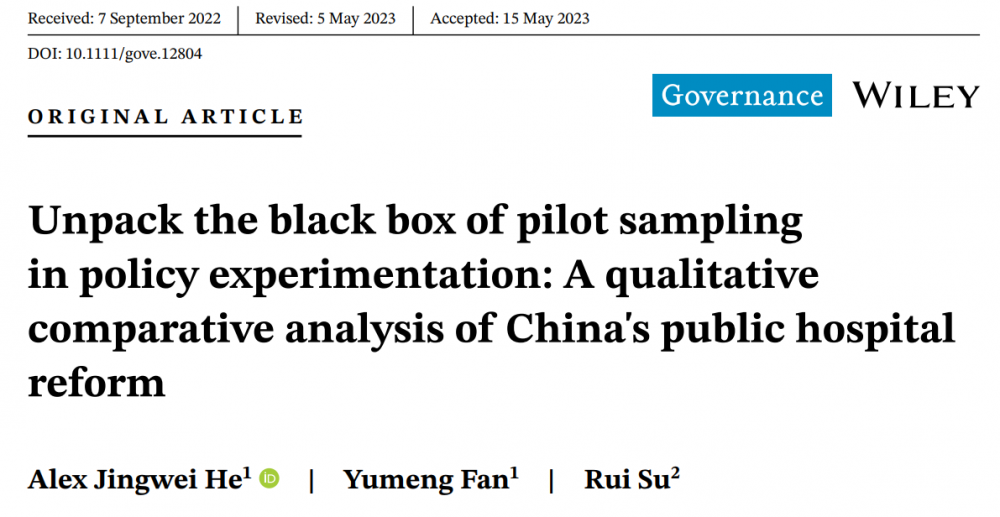太阳集团tyc8722博士生苏芮与合作者在国际重要期刊Governance发表论文
我们2021级公共管理博士生苏芮,与香港科技大学和经纬副教授以及研究员范雨萌在政治学及公共管理学科重要期刊Governance合作发表论文Unpack the black box of pilot sampling in policy experimentation: A qualitative comparative analysis of China's public hospital reform。


文章简介:
众所周知,公共政策话语中的政策实验(policy experimentation)概念是来源于自然科学的明喻。在自然科学中,以归因为目标的实验需要通过随机化(randomization)进行实验组与对照组的匹配,以保证实验场景的可控性(controllability)。然而,公共政策实践中进行这样严格条件约束下的实验几乎不可能。因此,对于政策制定者来说,如何选择试点单位(即subject)对于试点结果的学习和推广价值便至关重要。
该论文采用定性比较分析(QCA)结合阐释性案例的研究设计,在中国大陆公立医院改革的场景下,解释了政策实验中的重要理论问题:在多层级的治理体系中,中央政府选择地方进行试点的标准和逻辑究竟是什么?该研究提炼出五大试点选择样态(pathway),分别为piloting for challenge(再接再厉型/挑战“破冰者”)、Piloting for advancement(取长补短型/ 短板“主攻手”)、Piloting for innovation(一马当先型/创新“排头兵”)、Piloting for action(背水一战型/逆势“突围者”),和Piloting for regional generalization(以身作则型/区域“领头羊”)。在随后的阐释性案例分析中,本文分别选择福建厦门、广东珠海、上海、陕西宝鸡、甘肃庆阳作为上述五个组态的代表,利用公开资料,一一阐释中央政府选择上述城市进行公立医院改革试点的目的。
本文的研究发现,中央政府进行试点选择时的行为模式确实不能简单地用正向抽样或者是追求代表性来解释,而是呈现出更为丰富的样态。试点作为实验性治理的核心载体,发挥着治理的多重功能。
Abstract
Governments increasingly use policy experimentation programs to seek solutions for complex problems. Because randomization and controllability are unrealistic for real-world policy experiments, how subnational pilots are selected is crucial for generating sound evidence for national replication. However, the received wisdom on pilot sampling is thin and paradoxical. While some studies suggest that policymakers prefer to select regions with favorable conditions, others contend that securing representativeness remains the principal concern when it comes to pilot selection. This study resolves the paradox by elucidating the logic of selecting pilots in large policy experimentation programs. We focus on China's huge public hospital reform program and through a novel research design that combines comparative qualitative analysis and illustrative case studies we seek to explain the strategy for pilot selection. Our analyses reveal five distinctive pathways of pilot sampling: piloting for challenge, piloting for advancement, piloting for innovation, piloting for action, and piloting for regional generalization. Each modality represents a specific experimental purpose. We reveal that piloting serves as a versatile governance tool that can fulfill multiple functions in complex reforms.
全文链接:DOI: 10.1111/gove.12804



